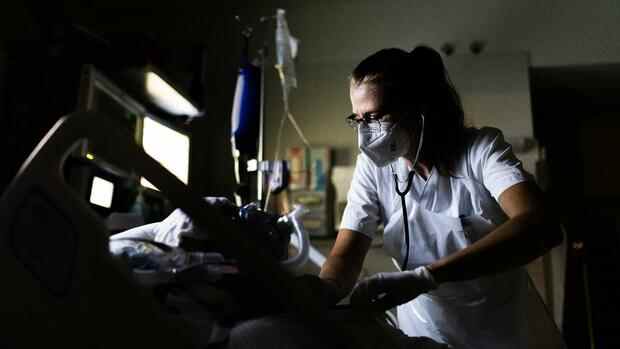Berlin There are clear words with which the works council of the Munich clinic raises the alarm in a fire letter. The emergency centers are overcrowded, it says. “The patients are piling up in the corridors.” The safety of the patients is no longer guaranteed, “the danger is real and provable”.
The reason for the situation is, among other things, the many staff shortages due to a corona infection or another respiratory disease that restricts operations. Currently, 30 to 50 percent of the staff of both nurses and doctors are absent, and there may soon be even more, the letter says. In addition, the number of corona patients is increasing rapidly.
Other regions and industries are already struggling with high staff shortages at the beginning of the autumn wave. The number of infections is not only increasing sharply in Munich and Bavaria. According to the Robert Koch Institute (RKI), the seven-day incidence in Germany is 787.5. In the previous week, the number of new corona infections per 100,000 inhabitants per week was less than half.
This is also noticeable in the clinics, where the occupancy of Covid patients has increased by 50 percent compared to the previous week. “With around 19,000 patients who tested positive, we are currently as high as at the peak of the summer wave,” said the head of the German Hospital Society (DKG), Gerald Gaß, the Handelsblatt. This means that more effort is needed to protect against infection, which in turn means more work and a greater burden on the staff. Staff shortages “will accompany us in the coming weeks and months and will also have a significant impact on supply,” warned Gass.
Top jobs of the day
Find the best jobs now and
be notified by email.
Staff shortages are also noticeable in other sectors. Figures from the umbrella organization of the BKK health insurance companies show that the sick leave of the insured throughout the year was higher than in the two previous years. A major reason for this is respiratory diseases. This is noticeable, for example, in the hotel and catering industry and among building cleaners.
“Sick leave is already unusually high – higher than in the pre-pandemic times,” said the general manager of the Federal Guild Association of the building cleaning trade, Wolfgang Molitor, the Handelsblatt. “Another wave of corona would be an enormous burden for the industry.” Molitor called on politicians to act with “a sense of proportion and pragmatism in order to avoid a further deterioration in the already tense personnel situation”.
Abolition of the obligation to isolate: Austria as a role model?
In view of the failures, the health policy spokesman for the FDP, Andrew Ullmann, called for the isolation obligation to be abolished. Accordingly, people infected with corona must isolate themselves for at least five days even without symptoms. “The isolation or sick leave should be a medical decision and not a state-fixed decision,” Ullmann told the Handelsblatt. “In addition to the clinical classification, it also plays a role which profession is practiced and what potential danger there is for contacts of the infected person.” It is already clear that it is not about all infected people automatically going to work.
At the end of September, the states of Baden-Württemberg, Bavaria, Hesse and Schleswig-Holstein had already asked Health Minister Karl Lauterbach (SPD) in a joint letter to lift the obligation to isolate. This could paralyze the critical infrastructure such as fire brigades, police and clinics, so the concern.
The countries refer to Austria in their letter. The country had replaced the obligation to separate in August with a “traffic restriction”. Anyone who is infected must wear an FFP2 mask for ten days in most places, but can go to their workplace. Infected people are only prohibited from visiting nursing homes and clinics.
The Minister of Health is sticking to the obligation to isolate.
(Photo: dpa)
The four health ministers write in their letter that the end of the obligation to isolate has not led to any relevant increase in reported cases in Austria. However, Lauterbach wants to continue to adhere to the obligation to isolate. In view of the number of infections, they “don’t want to pour oil on the fire,” he said.
>> Read here: Doctors are prescribing more corona drugs – the greatest effect so far in Pfizer’s order book
The general manager of the Confederation of German Employers’ Associations (BDA), Steffen Kampeter, demanded that companies should at least be able to introduce a mask requirement or other restrictions for those who are infected without symptoms. “The principle of personal responsibility and individual solutions in the company are existential for this,” he told the Handelsblatt.
An infection does not necessarily mean incapacity to work. However, it is difficult to estimate how high the number of cases of lost work due to Corona is. “Many employees are basic immunized due to infections or vaccinations that have already been overcome,” said Kampeter.
The head of the trade association HDE, Stefan Genth, called it a “question for the experts from science” whether the abolition of the obligation to isolate could be a sensible way. “In the end, it’s also about pushing back the pandemic even further.”
More: What distinguishes this corona wave from the others – and a great unknown
